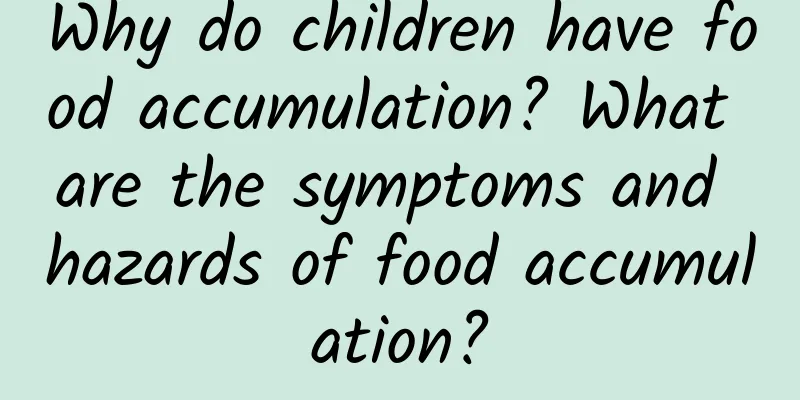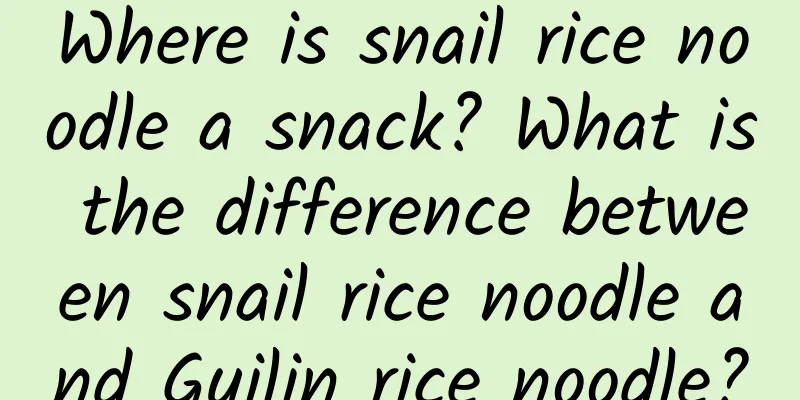Why do children have food accumulation? What are the symptoms and hazards of food accumulation?

|
Indigestion is easily ignored by parents Food stagnation is also called food stagnation. It is a disease in traditional Chinese medicine. It refers to a disease in which children eat too much or eat improperly, which exceeds the tolerance of their spleen and stomach, leading to a low spleen and stomach function. Clinically, it is characterized by loss of appetite, indigestion, abdominal distension or pain, sour and rancid belching or vomiting, bad breath, sour and smelly loose stools or constipation, and thick and greasy tongue coating. The Suwen Bilun chapter says: "Eating too much will damage the stomach and intestines", which states that the common cause of food accumulation is excessive eating, which exceeds the digestive capacity of the spleen and stomach, resulting in damage to the spleen and stomach function, which is the result of excess leading to deficiency. The Youyou Jicheng specifically mentions the mixed syndrome of deficiency and excess in food accumulation, and proposes that "food accumulation is caused by spleen deficiency", which means that the spleen and stomach cannot digest food even if the patient does not eat much due to weak spleen and stomach function, which is the result of deficiency leading to excess. Indigestion can occur alone or as a symptom of other diseases. For example, colds and coughs are easily accompanied by indigestion. Some children with recurrent respiratory tract infections will suffer from repeated external infections due to unclear internal heat, often with indigestion first and respiratory infection later, forming a repetitive vicious cycle. "The child's spleen and stomach are not fully developed yet, and their ability to receive and transport food is limited. In childhood, if we ignore the child's physiological characteristics and overfeed the child, the child's spleen and stomach will most likely be damaged. Once the digestive capacity of the child's spleen and stomach is exceeded, it may lead to food accumulation, but parents often find it difficult to detect." Symptoms of food indigestion In modern medicine, food accumulation is called functional dyspepsia, which can occur in people of all ages. When making a diagnosis, doctors will refer to the following: Before the onset of the disease, there was a history of breast and food damage, eating too much, too many kinds of food, too late, and no moderation in the frequency and quality of eating; Loss of appetite, distension and pain in the epigastric and abdominal regions, sour and smelly vomitus or belching, bad breath, or diarrhea, constipation, sour and smelly stool like rotten eggs, occasional abdominal pain that is relieved after defecation or farting, a preference for lying prone at night, and restlessness when sleeping; Irritability, crying at night or fever, undigested food residue or fat globules in stool; The tongue coating is often thick and greasy, especially in the center of the tongue. The harm of indigestion Wan Quan, a pediatrician in the Ming Dynasty, said in his book "Secrets of Infant Care·Symptoms and Treatments of Food Injury": "Food injury is the most serious symptom. If it is not treated for a long time, it will turn into accumulation and habit; if it is not treated properly, it will turn into malnutrition and tuberculosis." This means that when a child is initially injured by milk and food, the disease is still mild; if it is not cured for a long time, the disease progresses and may turn into accumulation; if it is not eliminated for a long time and is delayed and not treated, it will affect the child's growth and development, and the body will gradually become thin, which may turn into malnutrition (equivalent to malnutrition in Western medicine). "Specifically, indigestion can lead to anorexia. Long-term anorexia will affect the spleen and stomach qi and blood, and the body fluid will be depleted, resulting in malnutrition and weight loss. Involvement of the blood system may cause anemia. Involvement and impact on growth and development will lead to short stature and slow growth rate. Involvement of the liver can easily lead to malnutrition of the liver. Involvement of the vision can lead to decreased vision, dry eyes, and night blindness. Involvement of the spleen can easily lead to repeated mouth ulcers. Involvement of the intestines can cause the intestines to lose moisture, the stool is easy to be dry and hard, and symptoms such as constipation and anal fissures will appear. Involvement of the respiratory system can lead to repeated respiratory tract infections and repeated suppurative tonsillitis. Always being in a state of indigestion without relief will cause an imbalance of yin and yang in the body and a decrease in immunity." If parents find that their children have indigestion, they must pay attention to it to avoid various complications and damage to their children's health. How to prevent children from overeating Traditional Chinese medicine emphasizes the regulation of children's spleen and stomach, and it is important to "feed at the right time and eat in moderation." She suggested that children should eat in moderation to ensure the normal functioning of the spleen and stomach, otherwise overeating will damage the spleen and over-hungering will damage the stomach. Specifically, children should avoid eating too much and leave some space for the spleen and stomach. Eating time should be regular, three meals a day, and only 80% full; daily fruit consumption should also be limited, not the more the better, try to eat seasonal fruits; do not add night food, it is not recommended to drink milk, eat fruit before going to bed, etc. If you go to bed with a full stomach, the spleen and stomach will not get the necessary repair, which will easily cause abdominal distension and restlessness at night, and bad breath and loss of appetite when you wake up the next morning. Children over 5 years old should not drink anything other than water two hours before going to bed. It is best for children to have a balanced diet. Children with a hot constitution should eat less hot foods, such as shrimp, mutton, sea cucumber, turtle, lychee, durian, longan, mango, and wolfberry; children with a cold constitution should eat less cold foods, such as crabs, cold drinks, and mangosteen. "What should I do if my child has indigestion?" For children with indigestion, "Jiao Sanxian" (i.e., scorched malt, scorched hawthorn) and chicken gizzard can be used to help digestion, invigorate the spleen and stimulate appetite. To make it easier for children to take, half a candied date, appropriate brown sugar or maltose (maltose) can also be added to boil water to drink. Children with slightly heavier indigestion can also add fried radish seeds, or directly take Baohe pills orally. For children with weak spleen and stomach, some spleen-strengthening ingredients such as Chinese yam, lotus seeds, Poria, coix seeds, and Euryale should also be added to attack and supplement. Children with severe indigestion should use Zhishi Daozhi Pills (commonly used drugs include rhubarb, Zhishi, Jiao Sanxian, Poria, Atractylodes, Scutellaria, Coptis, etc.) under the guidance of a professional doctor. "For children under 6 years old who suffer from indigestion, parents can also use pediatric massage techniques and acupoint treatment to help their children digest food and strengthen their spleen." If the child's indigestion symptoms are not relieved for a long time, or if serious symptoms such as vomiting, severe abdominal pain, and diarrhea occur, it is recommended to go to the hospital in time to avoid delaying the disease. "If you want your child to be safe in all four seasons, you should keep him/her three parts hungry and cold. I hope everyone will follow this method, then naturally all diseases will not happen to him/her." This is a reminder to parents using the words written by Zeng Shirong, a famous pediatrician in the Yuan Dynasty, in "The Book to Keep Children Healthy", hoping that all children can grow up healthily. |
<<: Treatment of renal failure with integrated Chinese and Western medicine
>>: What are the precautions for diabetic diet?
Recommend
Sudden menstrual bleeding with lots of blood clots
Many female friends may be surprised and worried ...
What should pregnant women eat if they are constipated?
Constipation may have become a common thing for u...
Why does menstruation come every ten days?
Menstruation is indeed a very complicated experie...
What are the methods of treating uterine infertility?
Everyone longs to have a child of their own. We a...
What's wrong with my stomach aching?
Women are more prone to abdominal pain. Some wome...
What to do if breast development is not good
Breasts are on the chest of both men and women, b...
What does false labor feel like in pregnant women?
Pregnant women should have known about uterine co...
What are the advantages and disadvantages of drinking honey water for girls
As we all know, honey is a very natural health pr...
Recent light menstrual flow
Some female friends may find a problem that their...
What to do if the cervix is tilted to the left
Female friends all know that their bodies are str...
4 kinds of flowers are effective in treating gynecological diseases
Some beautiful flowers are not only ornamental, b...
Will I definitely get pregnant if I take progesterone tablets after ovulation?
After marriage, couples usually look forward to h...
How to distinguish the quality of black corn? How to cook black corn to make it delicious
Black sweet corn is high in iron and is a blood t...
How to supplement calcium effectively during lactation
We know that during pregnancy, the elderly in the...
What should I eat to enlarge my breasts during my period?
Most women want to have proud breasts, especially...









